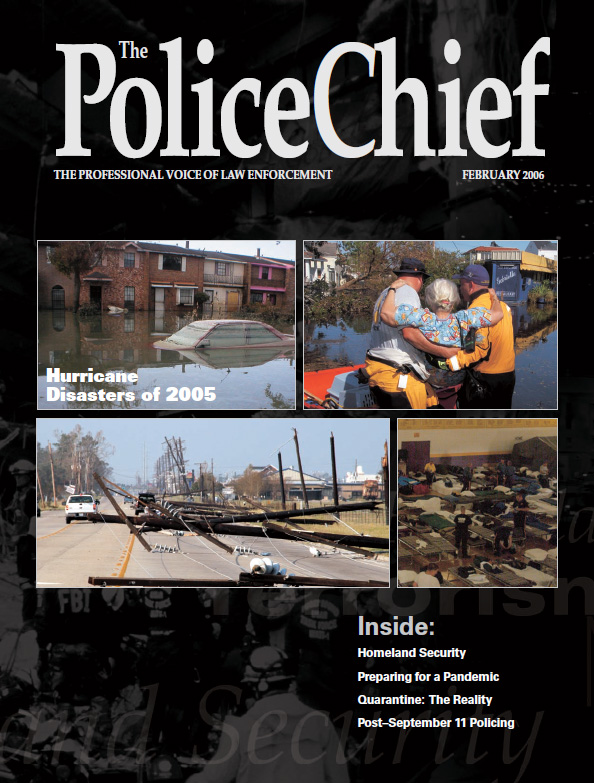
February 2006
The police must always be ready to respond to major emergencies, but the threats to public safety and homeland security seem to be multiplying. Today’s police department must prepare for emerging dangers such as a pandemic outbreak of avian influenza, catastrophic storms such as Hurricanes Katrina and Rita, and the ongoing menace of terrorism. On the cover: background photograph by FEMANews Photo; lower left inset photograph by Robert Kaufmann/FEMA; other inset photographs courtesy New Jersey State Police.
Articles
-
Pandemic Influenza and Bird Flu: The State of Delaware State and Local Law Enforcement Preparedness
Since the early 1900s there have been three flu pandemics in the United States that resulted in a significant loss of human life. Many health officials agree that it is only a matter of time before th... -
Quarantines: The Law Enforcement Role
Should the United States, or any portion of it, have to resort to large-scale quarantines to contain the spread of disease, it seems certain that state and local police will be deeply involved in ... -
Operation LEAD: New Jersey's Statewide Response to Louisiana in the Aftermath of Hurricane Katrina
On October 11, 2005, the final platoons of personnel, vehicles, and equipment assigned to the Louisiana Emergency Assistance Deployment (Operation LEAD), returned to New Jersey.... -
Hurricane Rita: Lessons Learned
Just a few days before the 2005 annual IACP conference opened in Miami Beach, Hurricane Rita skirted the Florida Keys as it strengthened from a category 1 to category 2 storm.... -
Special Focus: Community Policing and Homeland Security
Homeland security begins with local law enforcement and the community. The collection of information at the community level is critical to the overall homeland security mission. That's where it all ... -
Special Focus: Homeland Security: Common Sense Measures to Safeguard your Community
-
Special Focus: Law Enforcement Online: The National Alert System
The mission of the FBI's Law Enforcement Online (LEO) National Alert System (NAS) is to enhance communication, coordination, and cooperation between federal, state, and local government agencies repre... -
Special Focus: Post-September 11 Policing in Suburban America
Since the terrorist attacks on the United States on September 11, 2001, the entire law enforcement and emergency services sectors have had to review, and in some case redefine, their roles in their co... -
Consuming and Applying Research Evidence-Based Policing
There are many good reasons why successful law enforcement executives will have to be consumers and appliers of research. They do not need to become researchers themselves, but they must use the resea...
Columns
- President’s Message: Time to Review the IACP Constitution and Rules
- Chief's Counsel: Should Law Enforcement Agencies Apologize for Mistakes?
- Survivors' Club: February 2006
- From the Director: Tactical Information Sharing System
- Legislative Alert: House, Senate Approve Budget Reconciliation Bill with Digital TV Deadline
- Advances & Applications: February 2006
- Highway Safety Initiatives: Elements of an Effective Traffic Safety Initiative
- IACP News: February 2006
- Product Update: February 2006
- Index to Advertisers: February 2006

